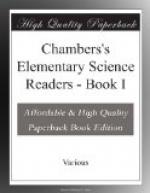2. Crash came the coal on the ground. Then the coal-man drew his horse and cart away, and set to work with a spade to fill the little coal-place.
3. The dog jumped, and got in every one’s way. He wanted to help, too, but did not know how. Dora tumbled over the heap and bumped her head, so she thought she would be content with watching Jim and Harry. But Harry was soon tired, and Jim was left to go on alone.
4. ‘Where does coal come from, Jim?’ he asked.
‘Out of the ground, my lad.’
‘Does it? Do you dig for it?’
‘I don’t. But I know somebody who does.’
5. ‘If I were to dig for it, should I find any, Jim?’
’Not you! Why, you have to go down ever such a long way before you can even begin to dig.’
6. ‘How do you get down?’
’You go down in a thing they call a cage. You can’t walk down, you know. It is like going down a deep pit. They call it a mine.’
7. ‘Oh, I have heard of coal-mines!’
Dora was taking up one little lump of coal after another, and wondering why it was so shiny if it had really come out of the earth.
8. Harry went on. ’How do they let the cage down? Have you ever been down?’
[Illustration: Coal-miners going down to work.]
‘I have been down once,’ said Jim, stopping in his work and stretching himself. ’This is the way. There is an engine at the top of the shaft’——
‘What is the shaft?’
9. ’The pit I told you about. The engine is fixed there and it lets down the cage and pulls it up again. Half-a-dozen men or so can go in it at a time.’
‘It must be very strong.’
10. ’Yes, it is, and it has strong chains to hold it. It goes up and down all day long, bringing up the coal.’
COAL.
PART 2.
re’-al-ly eas’-i-ly slic’-es straight knife be-tween’ met’-al fetched pic’-tures an’-i-mal whole for’-ests thou’-sands piec’-es to-geth’-er puz’-zles
1. Next day the children asked their mother to tell them what coal really was. Harry did not think it was a stone, because he had broken two or three lumps with a hammer. He found that it broke much more easily than stone.
2. Besides, it did not fly all into sharp bits, but came off in slices; and he saw that it had straight lines along it. When he poked his knife in between these lines, he could take off a slice of coal at once!
3. Dora did not think it was a metal, because she had learnt that iron would melt in a fire and flow like water. ‘Coal does not melt,’ she said, ‘every one knows that!’
4. She took a small lump out of the coal-box, and Harry did the same. Mother then fetched some pictures, and one or two other things, and the talk began.
5. ’It is no wonder that you can’t guess what coal is! It does not look at all like what it was at first. It was not always in the ground; it used to live on the top and get the air and sunshine.’




